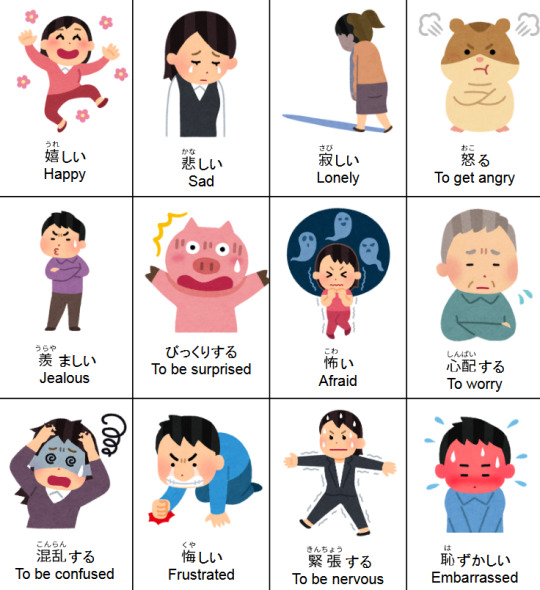Text
Japanese Apps instead of Duolingo
Beelinguapp
Bluebird
Bunpo
Busuu
Clozemaster
Drops
HeyJapan
Hiragana Quest
Infinite Japanese
kawaiiDungeon
Ling
Lingodeer
Lingopie
Lingvist
LingQ
LyricsTraining
Mango
Mondly
Oyomi Japanese Reader
renshuu
Takoboto Japanese Dictionary
Todaii
Qlango
Write It! Japanese
730 notes
·
View notes
Text
something i'm starting to really really enjoy is writing little media summaries in japanese using words i've learned! it's super fun and helps nail in sentence structure.
2 notes
·
View notes
Text
Big fan of the kanji for ashita (tomorrow in japanese) being 明日 (明 - bright, 日 - day). I don't know the actual origins but, intentional or not, It's so beautifully optimistic. Tomorrow's looking bright man
63 notes
·
View notes
Text
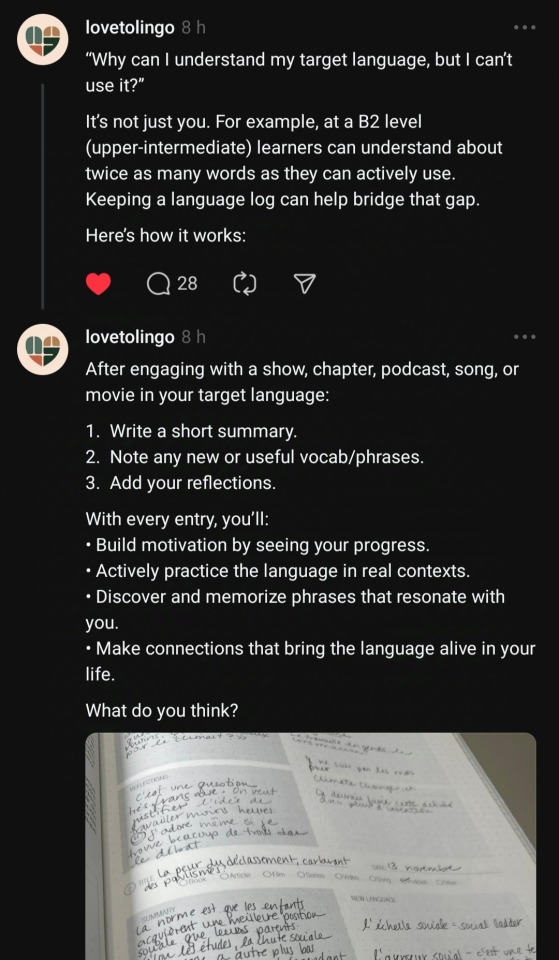
I very much agree with these suggestions. Forcing myself to write was the way I could finally start to become an active rather than a passive user of the target language.
3K notes
·
View notes
Text

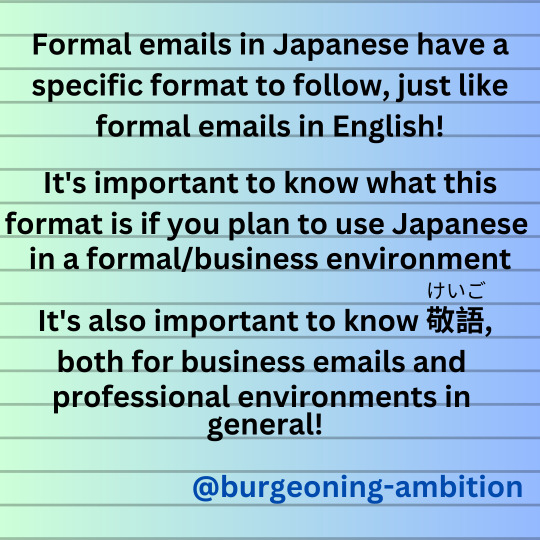
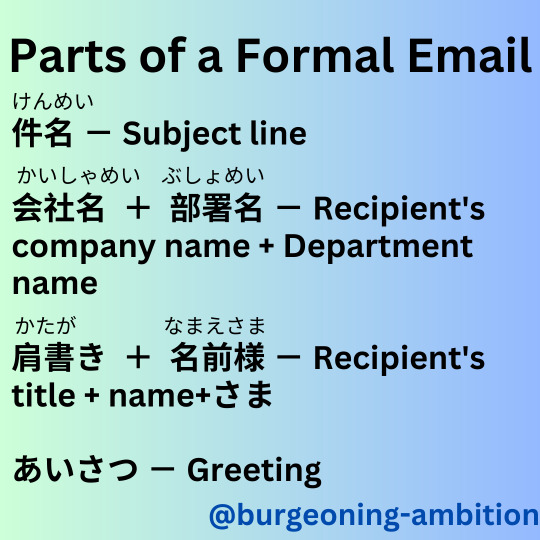

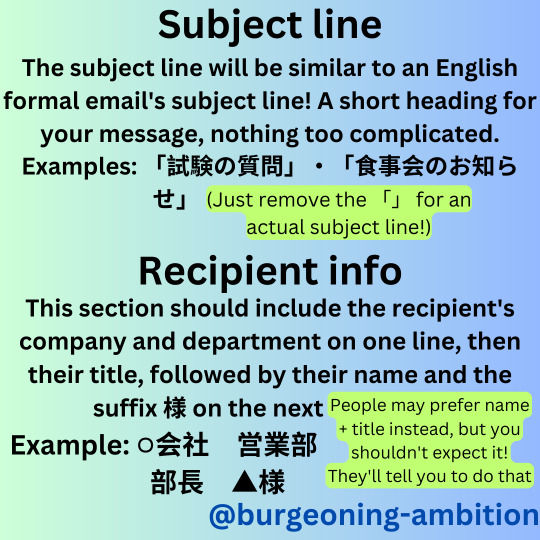

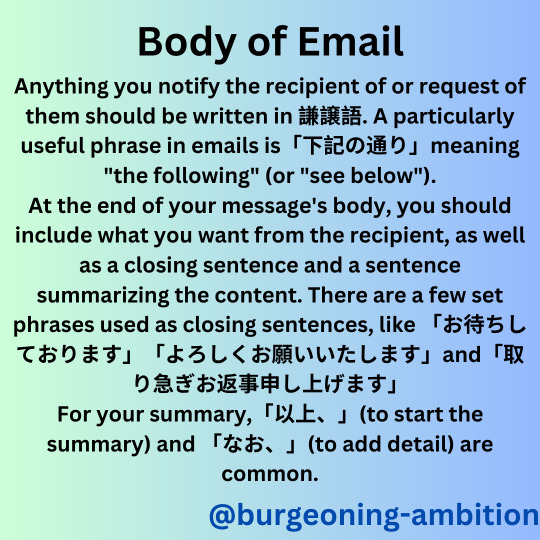
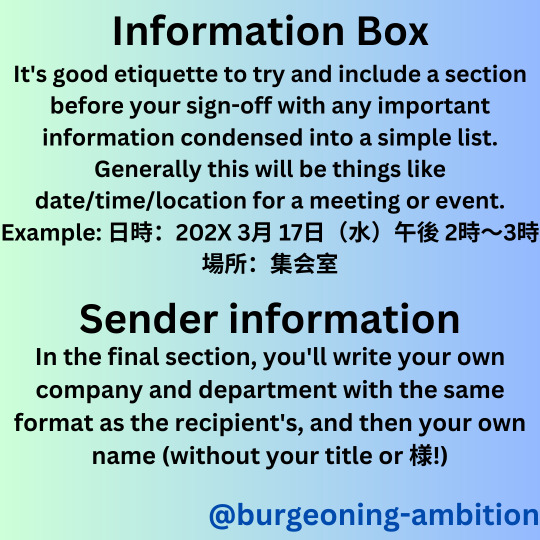
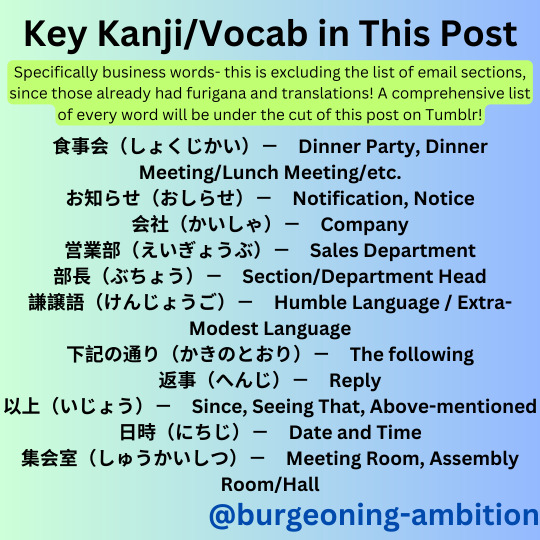
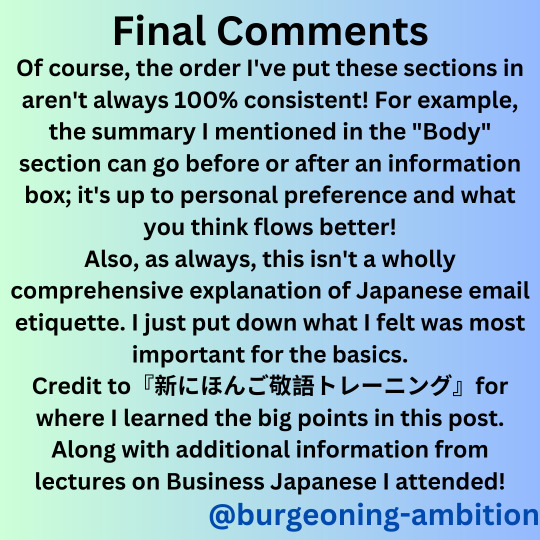
Business Japanese Review Part One: Emails!
I'm not sure how many posts I'll make about Business Japanese, but probably more than one so I say the part one is warranted, haha.
Feel free to add anything or any questions in the notes! Like I said, this isn't a fully comprehensive infographic. Also, what do people think of the lined paper style background for the title page/intro? I think they look kinda cute for the introduction, but not for the informative parts...
One thing I will add that I couldn't fit on the slides: I think some textbooks don't have super clear distinctions between 「謙譲語Ⅰ」 「謙譲語Ⅱ」 and 「ていねいご」, so I only specifically mention 謙譲語 broadly here. Parts of 謙譲語Ⅱ and ていねいご are both described as "extra-modest" in some things, for example! Just keep in mind that my post is a simplification, and if you're interested in formal language, maybe start at learning all of the different keigo categories and what they involve!
Vocab list note: The set phrases in the greetings and closings are all comparable to set phrases in English for greetings and closings of emails. I'm putting these set phrases in their entirety in the list, with a comparable English set phrase as the definition. Do not take these as equivalent phrases! They have a similar feeling, but I am not asserting that they have identical meanings. I'm just offering something comparable in case it helps a person make more sense of them!
The full vocab list + a transcript of the post is under the cut!
Vocabulary List
試験(しけん)- Exam, test
質問(しつもん)- Question
食事会(しょくじかい)- Dinner Party, Dinner Meeting/Lunch Meeting/etc.
お知らせ(おしらせ)- Notification, Notice
会社(かいしゃ)- Company
営業部(えいぎょうぶ)- Sales Department
部長(ぶちょう)- Section/Department Head
「いつもお世話になっております」 - This is a basic email greeting, similar to "Good afternoon" or "Hello, [name]" even though the meaning doesn't match at all!
「だんだん涼しくなってまいりました」 - Similar to "I hope this email finds you well"
さて - Now, Well, Then
謙譲語(けんじょうご)- Humble Language / Extra-Modest Language
下記の通り(かきのとおり)- The Following
返事(へんじ)- Reply
「お待ちしております」 - Similar to "Awaiting your reply"
「よろしくお願いいたします」 - Similar to "Thank you"
「取り急ぎお返事申し上げます」 - Similar to "Please get back to me soon"
申し上げます(もうしあげます)- To Offer, To Extend (thanks, congratulations, greetings, etc.), To Do, To State(謙譲語)
以上(いじょう)- Since, Seeing That, Above-mentioned
なお - Furthermore, In Addition
日時(にちじ)- Date and Time
午後(ごご)- PM (Time)
場所(ばしょ)- Place, Location
集会室(しゅうかいしつ)- Meeting Room, Assembly Room/Hall
901 notes
·
View notes
Text
i've officially finished the beginner/basics section in renshuu! now for n5 basics.
6 notes
·
View notes
Text
[vocabulary] サシで? 🥺 *pangs of jealousy*
Here’s a neat little phrase I stumbled across recently.
I was telling a Japanese friend that I'm going out for a meal with another friend, and he dropped this on me:
サシで?
I had no idea what it meant, so I asked. Turns out, サシ comes from 差し向かい, which means “face to face.” So when someone asks 「サシで?」, they’re basically saying, “Just the two of you?”
It is used with the で particle, like in:
サシで飲む to have a private drink
or
サシで話す to talk one-on-one
From サシで飲む also comes the noun サシ飲み (a private drink), which seems to be pretty common.
It can also be written in kanji as 「差し」.
Now you can ditch your 二人きり and use サシ instead to impress your Japanese friends ;)
365 notes
·
View notes
Text
「ノート」 vs 「メモ」
This is a false friend in Japanese. Both are obviously borrowed words from English (”note” and “memo”). But a note isn’t ノート! You’d think so, but this is a case of Japanese taking a word and making it their own with little regard for the original meaning. ノート refers to a notebook, not the notes themselves. Those are メモ!
499 notes
·
View notes
Text
words that i'm really REALLY struggling to remember:
自転車 (じてんしゃ)
定規 (じょうぎ)
楽しい (たのしい)
#baffy talks#japanese langblr#i'm tryna remember how they're pronounced before introducing the kanji but#i think the kanji would help a lot 😭😭😭
1 note
·
View note
Text
The Difference Between シ and ツ
The secrets to easily recognizing these kana are hidden in the stroke order!
(images from japanesewordswriting.com)
SHI し シ


Hiragana し begins with a long vertical stroke down the left side, and ends with a swish to the upper right.
Katakana シ begins with two small lines along the left side, and ends with the same swish to the upper right that its hiragana counterpart had.
You can tell that シ is し because the lines on シ will be coming from the left side!
TSU つ ツ


Hiragana つ begins with a long horizontal stroke across the top, and curves down with a swish to the bottom left at the end.
Katakana ツ begins with two small lines along the top, and ends with the same swish to the bottom left that its hiragana counterpart had.
You can tell ツ is つ because the lines on ツ will be coming from the top!
More Pics to Further Illustrate




Hopefully this helped someone out there! Best of luck in everyone’s studies!
145 notes
·
View notes
Note
hi, I'm also started to learn language, Japanese, can you make a lil info how you started..
Love you 💗 💓
hi anonie! ☺️ honestly, imo the best way to start things is to not overthink it — this is something you've never learned before, so of course you might not know the best way for you to learn it right off the bat.
i have friends who learned japanese through workbooks and paid classes, friends who moved to Japan specifically to learn, friends who like me just started using Duolingo before their vacation there, and those who just learn through anime. the key is finding/crafting the method that works best for you.
⏰ how to make it a daily habit (practice makes perfect it easy!)
💪 how to motivate yourself (a trip to Japan? a dream job? an anime? something else?)
📈 how to track progress and drive growth (ok, so you do need a little planning, but not too far ahead because things will change)
(further examples/elaboration under the cut 👇)
how i make language learning a daily habit:
🦉 an app for easy bite-sized lessons (it doesn't have to be Duolingo, there are many alternatives popping up now that you can readily find with a simple Google search, especially if you already have a specific target language)
✏️ handwriting practice (doubles as review, i do it on paper because it feels more natural and like it really sinks into my brain that way)
🎧 listening to short contents on YouTube like vlogs or podcasts or music (most times i'm not even actively trying to learn the language, i'm just passively listening and absorbing and then i'll suddenly realize — oh, i know that word! i understand that phrase! and it's so fun and motivating too)
how i motivate myself:
🎯 have both a long-term and short-term motivation
🏹 long-term examples: a trip, a goal of communicating better with friends, an idea of your future self that is fluent 😌
🤯 short-term examples: an anime episode, a learning streak, low-key bragging about learning to others 🙈
how i track progress and drive growth:
📒 ok, so i said don't overthink and just start, but once you progress a bit in your learning you'll start to notice certain aspects of the language that come easy and others that don't, so you have to make space in your study plan for those — even if your teacher / the workbook or app you're following doesn't
🧠 e.g. i'm terrible at memorizing new vocabulary and more complex grammar patterns end up confusing me, so when i encounter those, i study them repeatedly and try to expose myself to as many examples in different contexts and mediums as possible
💻 if you're ever stuck when understanding something, just be resourceful — ask Google, translation apps, forums, more advanced Japanese studyblrs on here
📝 so that's how i make sure i'm not stagnating and always learning and growing although i'm mostly self-taught. one thing i'm still working on is how to get better at tracking my progress more concretely beyond a personal feeling of accomplishment and ease when i try to understand or be understood in my target languages. apps are also good for this, or if you take/study for the JLPT (i just don't want to because of my testing anxiety lol)
💌: this was uh, more than a lil info, but hope this helps! 頑張って!! で���る!
22 notes
·
View notes
Text
to those who know me, i'm a writer. i'm super prideful (borderline arrogant) in my writing in english and i've been praised for my ability to write really captivating stories. i'm more well-known as an artist, but i'm like a million times more confident in my ability to create via writing.
but anyway, something i like to do as a fun exercise when learning japanese is to write little excerpts about my favourite fictional characters or my dog and i write them having little adventures to help me remember how to use words, sentence structures, and particles.
it's kinda silly but today i had learned enough to be able to write a three-sentence story. before i was only able to do one-sentence, but i'm improving! i'm really, really improving! and it felt so good to write a small little story.
11 notes
·
View notes
Text

okay okay okay i need to put this down in writing to solidify my schedule or i'm gonna keep forgetting:
morning (before breakfast): new word introduction via sushi game and/or renshuu
morning (after breakfast): reading sentences + remembering words introduced by renshuu or sushi game via anki's flash cards
afternoon (before lunch): break time
afternoon (after lunch): break time
mid-afternoon: wagotabi + renshuu and/or genki study and review
nighttime (before dinner): journal entry in kana
nighttime (after dinner): break time
nighttime (before bed): wanikani and sushi game
#i'm on the grind rn#might loosen up as i get more comfy but yknow#baffy talks#japanese beginner#japanese langblr
2 notes
·
View notes
Text
me: struggling to remember how to say ではありません
me: dreams about practicing japanese
me: wakes up and immediately has 0 issue with remembering how to say ではありません
4 notes
·
View notes
Text
信念
しんねん
belief; faith; conviction
信念を行動に移した。 しんねん を こうどう に うつした。 I put my beliefs into action.

12 notes
·
View notes
Text
new list for stuff i want to learn! wish me luck!
な adjectives:
~じゃない > ja-na-i (negative referral / casual)
~ではありません > de-wa-a-ri-ma-se-n (negative referral / formal)
~だった > da-t-ta (past tense referral / casual)
~でした > de-shi-ta (past tense referral / formal)
~じゃなった > ja-na-t-ta (past tense negative referral / casual)
~ではありませんでした > de-wa-a-ri-ma-sen-de-shi-ta > past tense negative referral / formal)
い adjectives:
~くない > ku-na-i (negative referral / casual)
~くないです > ku-na-i-de-su (negative referral / formal)
~かった > ka-t-ta (past tense referral)
~くなかった > ku-na-ka-t-ta (past tense negative referral / casual)
~くなかったです > ku-na-ka-t-ta-de-su (past tense negative referral / formal)
2 notes
·
View notes
